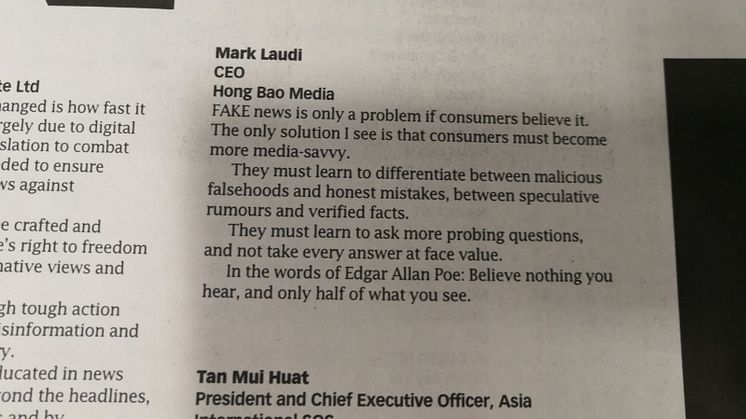
Blog post -
Can we ever defeat fake news?
The short answer is, no. At the end of this column is an experiment that will help you see why.
I commented on this in last week's Views From The Top column in the Business Times, and I thought it would be useful to expand on why I wrote what I wrote.
There is lots of handwringing about fake news – the phenomenon of malicious lies written up as news stories, being shared and amplified through social media – and calls to regulate technology companies like publishers.
But I foresee many problems.
- Who gets to decide what is fake? It's not hard to foresee that people on either side of the political divide will always label stories which cast them in a bad light as fake news. Trump seeds such doubts all the time.
- How will regulators prove malice? Sure, a story might be inaccurate or wrong, but journalists make errors all the time and you frequently see corrections published in newspapers all over the world. That is not to excuse them. But getting facts mixed up is very different from deliberate obfuscation.
- How fake does a story have to be, before it is labelled fake? The first lesson you learn in journalism school, and perhaps the most important, is that all news is fake news to some extent. It's just a question of how much.
Communications Directors would be well aware of the problem. You would act quickly to counter a fake news story floating around about your brand, but clearly you would craft the story to suit your own messaging. Does that make the story squeaky clean and completely true?
Journalists, too, have to make judgement calls all the time on the veracity of the information they include, the reliability of their sources, and how much of their own biases impact the story. The act of observing changes the observed. You soon realise that objectivity is a simply unattainable goal.
To bring this home, here is a simple experiment. Let's say you are a TV reporter. You are in a helicopter hovering over your city, reporting live-to-air on the traffic situation. Suddenly you spot a car crash on a highway below, a ten-car pile up. There are clearly severely injured people in their cars. But traffic is banking up on both sides, and ambulances can't get through.
Now you have to make a decision:
1. Do you instruct your pilot to land so you can ferry the injured to hospital in the news helicopter? But this would mean you would become part of the story, and influence what happens.
Or
2. Do you instruct your pilot to continue to hover over the accident site so that you can report on it without influencing the story? At least that way you remain a dispassionate observer and an objective reporter ...even if it denies the injured immediate medical help.
Would you land and help? Or hover and continue to film?
People get very worked up over this question and argue vociferously for their point of view. But I am yet to come across an audience that agrees universally on an answer.
For the same reason, no audience can ever universally agree on what is fake news.
The bottom line is: fake news has always been with us, and it is here to stay. Media consumers must simply be more media savvy, to be able to make up their own minds, and to tell the difference between facts and BS.
Hence my comments in BT last week.
